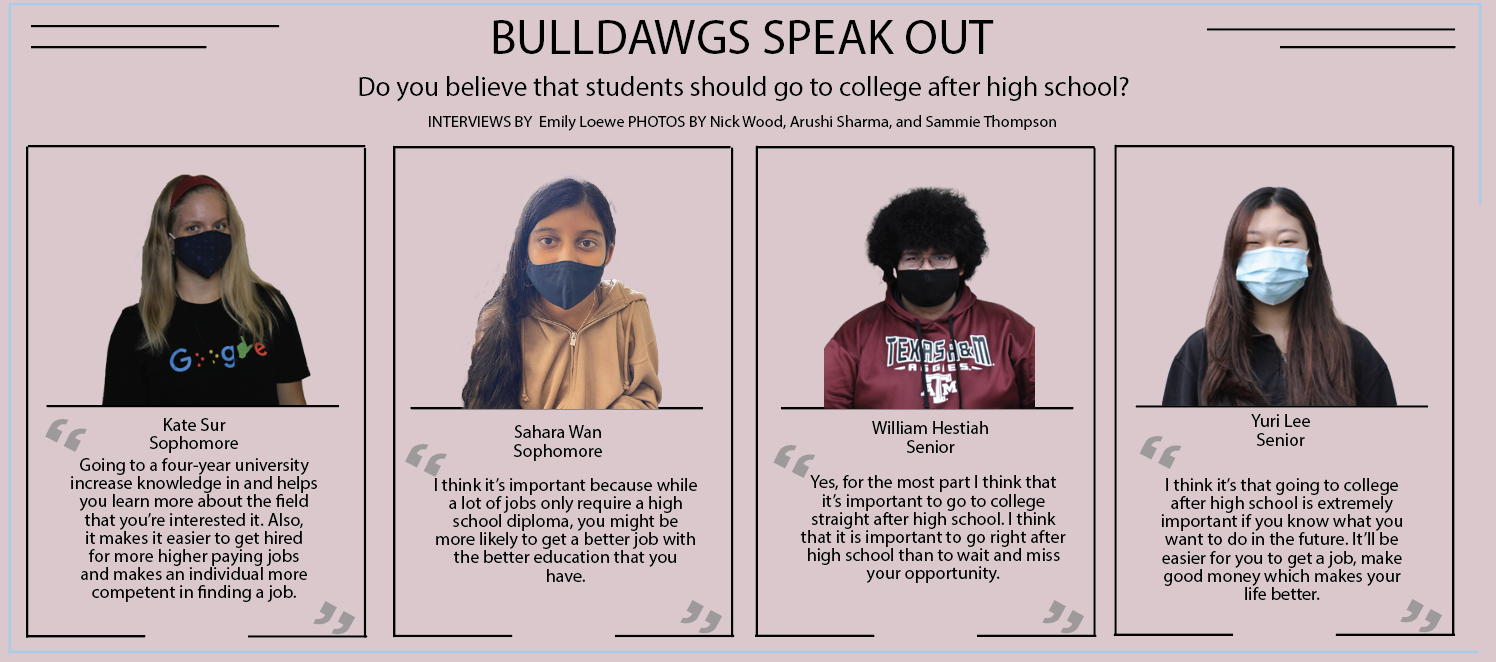Application season sparks college debate
December 14, 2021
PRO: College after high school is the best option
The cost of pursuing higher education is rising and with that, so does student debt. With that narrative going around the U.S., many may have reason to believe the value of a college degree is in decline. However, there are a number of important reasons why that is wrong.
A college education is more important now than ever before as a college degree is still the most secure way to increase wage potential in later stages of life. In addition, the modern world is rapidly growing with a rise in artificial intelligence and technology calling for multi-talented, intellectual, flexible critical thinkers in our workplaces proving that college is, and will increasingly be, the best way to prepare for an extremely industrial and uncertain future.
Looking at wage alone, college is crucial in finding job security in the very unstable and uncertain economy of the 21st century. A report on the value of higher education conducted by the Center on Education and the Workforce at Georgetown University found compelling evidence that “people who earn bachelor’s degrees and work full-time can expect to earn 84% more than their peers with a high school diploma over their lifetime.”
Even beyond the significant raise in wage earnings, college graduates also receive increased employer-provided fringe benefits such as health insurance and retirement plans that result in better health and longer life expectancy. This shows the important role a college degree plays in long-term job stability and the earning of a sufficient wage for your future.
Not only will a degree help you but may also help your community. The Chronicle of Higher Education states that “graduates with bachelor’s degrees pay $563,000 more in taxes than high-school graduates who never attend college,” proving that your earnings benefit you as an individual but the greater economic environment.
A college degree will help you become a better worker in future environments. Rapid advancements in all aspects of life, most importantly technological advancements, are changing the landscape of what it means to be a worker. The rapid spread of these advancements will limit the amount of available job options shifting focus to more STEM and technology based jobs. These jobs need to be filled but require employees with those STEM backgrounds such as engineering and software development along with communications, business and humanities backgrounds with the ability to market products, recruit potential investors and interact with clients and the media. College graduates offer the specific intelligence and growth potential to control changes and contribute positively to the development of modern technology.
A college education offers lifetime skills such as the ability to attack a wide array of problems, professionally communicate with others, and the ability to efficiently manage projects and problems.
Without a college education, an individual does have the ability to gain some of these skills but a four-year degree is able to expand and offer extensive experience with these skills. Through an abundance of classes, learning opportunities such as internships or research and interpersonal interactions, students are prepared for a diverse working world. These skills can often be looked at as useful but again, the job market and technological world is changing, and these skills will help individuals change and flow with it.
America has great privilege when it comes to college, a promising factor in our country’s future. It’s important to take advantage of that privilege to better yourself and our future as an economically and relationally advanced world. A college education is obviously not the only path out there, but it’s proven to be the strongest path toward job and financial stability which is a highly important factor to consider when deciding what path is best for you.
CON: Success is not entirely determined by college
“When I was in college…” the story so many students hear from their parents during high school. The standard of attending college is impressed upon students as soon as elementary school, narrowing the way they view their future. Many students stride through high school with the underlying perception that getting admitted to college is the only option. Despite the impression we receive from adults and authority figures throughout our lives, college is not the best option available to everyone.
College has significantly increased its admission requirements regarding academics, personal values and philanthropy. The system of admissions has been majorly reformed. What makes an applicant attractive to the admissions office has become significantly stricter and centralized around GPA, class rank and various other academic rankings.
Obsessively monitoring our GPAs, enduring the intense preparation for standardized tests, we subject ourselves to the enormous process of getting admitted to our dream college.
With parental and societal pressure, college feels inevitable, as if it is already decided. This overwhelming pressure leads students to feel as though these numbers define them. The degradation of self-worth through the application process discredits students of their natural talents and presence both in their school and in the world.
Furthermore, college has become unaffordable. To attend the University of Texas at Austin; tuition, living expenses and other essential amenities land above $30,000 yearly. Even the application fees range from $50-100. This is unmanageable for many families and presents unfair advantages to those born into financially stable households.
Since the 1980’s tuition to public universities has risen an astounding 213%. With the assistance of financial aid and scholarships students can get the price reduced to just above $13,000 a year. These total’s are still unreasonable for students of low-income. The investment required to receive an education in America is unjust and for many is not worth the money.
Although college is definitely a valuable experience with many positive opportunities for education and future success, you can find the same success without a college degree.
For those who choose to not attend college, there are plenty of opportunities for success. Society often represses our recognition of alternate options. The standard tells us that graduating college is the only way to achieve success and stability. This is completely untrue and it is important to explore alternate options as closely as you examine different universities.
Although college is definitely a valuable experience with many positive opportunities for education and future success, you can find the same success without a college degree. Some of the most common paths those who intend not to earn a four-year degree pursue are; cosmetology school, earning a real estate license, welding school, enrolling in nursing school, applying for internships that interest them, apprenticeship, and going to a community college first.
By pursuing their interests after high school, many find passion and financial stability without the increasing costs and stress of college courses. Although college is the best option for those who aspire to pursue careers such as a doctor, or engineering, for those unsure in the financial and life changing commitment to college, more appealing alternatives can be considered.
Societal pressures and expectations surrounding college should not influence the personal decision if college is the most valuable option after high school. There are so many benefits of investigating the advantages of other opportunities. With the unreasonable financial commitment as well as mental degradation of college, everyone should explore other options as thoroughly as they research universities. The decision rests on the goals and an individual’s situation, but college is not always the best available option.

